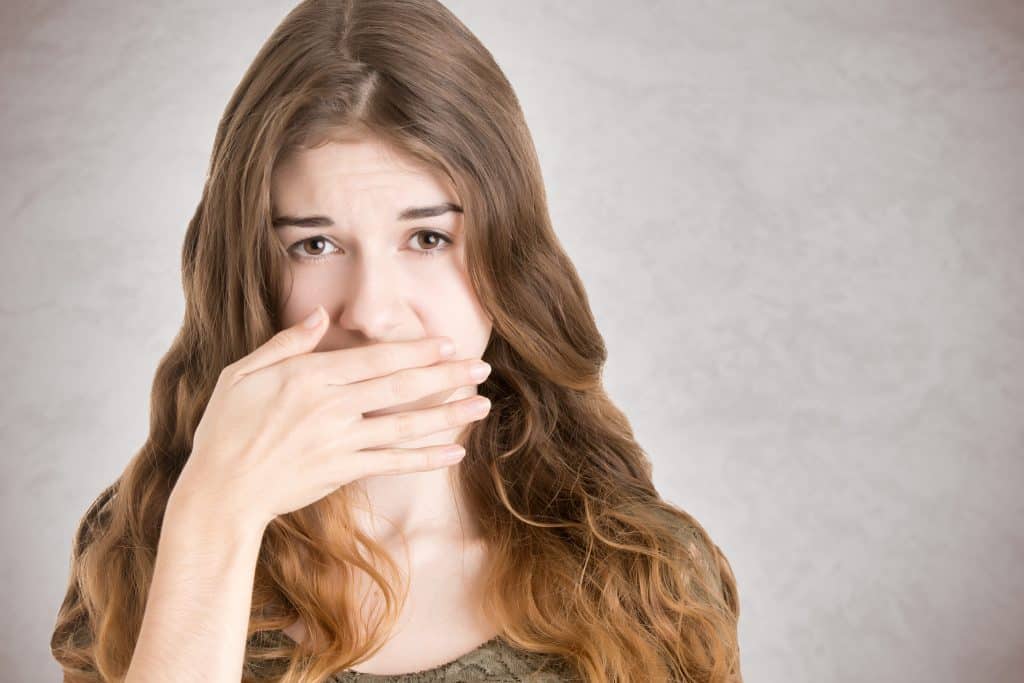Nearly everyone has moments of occasional bad breath, but for some, bad breath is a daily battle for which they struggle to find a permanent solution. While most people can rely on brushing, using a mouth rinse or reaching for some chewing gum, some 25 percent of Americans are affected by recurring halitosis, or chronic bad breath.
The battle for many is understanding the causes of bad breath, why temporary solutions don’t work for everyone, and how to handle an ongoing problem. In many cases, halitosis is caused by a lack of quality oral care, but that’s not always the case. In some instances, bad breath is caused by an outside factor that’s more difficult to control.
Common Causes of Bad Breath
In most cases, a meal or just waking up in the morning can leave a bad taste in your mouth. But if brushing and following a strong oral hygiene routine doesn’t alleviate your bad breath, you may consider one of these issues as the culprit.
Prescription Medication
Many prescription medications can cause dry mouth. When saliva production decreases, your mouth becomes a dry bed for odor-causing bacteria. An extended period of dry mouth can become uncomfortable and lead to bad breath. In addition, some medicines, when digested by the body, release chemicals that are carried by the blood stream and ultimately affect your breath.
Certain Foods and Drinks
Odor-causing particles live in garlic, onions, spices and other foods. When you consume those foods, the particles enter the blood stream and eventually make it to the lungs. So, with each breath you exhale, you release that odor through your mouth.
Coffee
Coffee not only has a strong flavor that can quickly create a bad breath experience, but it also has the power to stick with you throughout the day. The caffeine in your coffee can decrease saliva production, making way for odor-causing bacteria.
Alcohol
The more often you drink alcohol, the more likely you are to experience bad breath. Having several alcoholic beverages greatly decreases the amount of saliva production and creates an environment for bacteria to grow. The feeling of needing to rehydrate after a night of drinking is the same feeling that causes bad breath.
Excess Sugar
Sugar interacts with the existing bacteria in your mouth and can quickly cause halitosis. A diet that is rich in sugar means you’re constantly battling bad breath because the natural bacteria in your mouth converts the sugar into a sour odor.
Excess Protein
Finally, a good reason to eat carbohydrates. A diet high in protein and low in carbs can create bad breath. Your body needs a certain amount of carbs – good ones – to keep your metabolism functioning properly. Without those carbohydrates, the metabolic process changes and can lead to bad breath. In addition, certain high-protein foods are difficult for your body to digest and release a sulfurous gas when they don’t metabolize. Eating a balanced diet, filled with fresh fruits and vegetables, is the best diet for fresh breath.
Tobacco
Whether it’s cigarettes or a smokeless product, tobacco can create bad breath and a number of other serious oral complications. Beyond smelling like a smoke-filled hole, tobacco can also cause gum disease, damage gum tissue, and lead to oral cancer.
Gut Problems
A temporary cause of bad breath is poor digestion, bowel disorder, and constipation. Gut issues that create acid reflux also cause bad breath through the odors of recently eaten food being released through the esophagus.
Dry Mouth
Dry mouth can occur even without the consumption of prescription medicine. Saliva is necessary to help break down food as it enters your mouth and continues into the digestive system. Without an adequate amount of saliva, food particles remain, and bad breath is likely to follow. Xerostomia is when the production of saliva slows or stops. This naturally occurs when we sleep at night, which is why we wake up with offensive breath.
While each of these factors can be contributing reasons for bad breath, the number one cause of halitosis is poor oral care. Gum diseases, such as gingivitis and periodontitis, are developed through tartar and plaque buildup on the teeth, which also cause bad breath. It’s best to visit your Bridgeport / Trumbull Line Dentist to determine if gum disease is playing a role in your halitosis.
How To Cure Bad Breath
Because a lack of oral hygiene is the top contributor to recurring bad breath, it’s crucial that you maintain regular dental cleanings and examinations. Not only will your family dentist perform the cleaning, but he can also evaluate for gum disease or other oral issues, like cavities, that can cause foul odors in the mouth.
It’s important to note that chronic bad breath can also be a warning sign to other major health challenges. If your Shelton dentist determines you don’t have gum disease and no other outside factors seem to play a role, visit your primary physician. In some cases, gastrointestinal diseases may cause bad breath. While liver or kidney disease and uncontrolled diabetes often have other symptoms beyond odorous breath, it could be a warning sign that a larger health issue is at play.
When it comes to improving your bad breath, there are many daily tasks you can complete to help eliminate and prevent the offensive odor. Be sure your at-home dental care includes brushing your teeth at least twice a day, specifically after meals. Floss once daily to ensure you don’t miss particles of food that can contribute to bad breath. Use a dentist-recommended mouth rinse before bed to wash away the remaining bacteria.
Avoid use of tobacco products and excessive drinking. Both habits can prevent saliva production and make it easier for bacteria to multiply. Drink plenty of water. Dry mouth may occur even if you’re not on a medicine with the side effect, so stay hydrated to boost saliva production.
Keep your routine dental cleaning appointments with your dentist. Not only will this help support a healthy smile, but it also gives your Bridgeport / Trumbull Line dentist the opportunity to detect small issues before they become major dental emergencies.
Home | In The News | What Causes Bad Breath And How To Treat It
What Causes Bad Breath And How To Treat It

Disclaimer: The information provided in this blog is for informational purposes only and does not constitute medical advice. Consult a qualified dental professional to determine the best dental/orthodontic treatment for your needs.
